| Shropshire Hills National Landscape | |
|---|---|
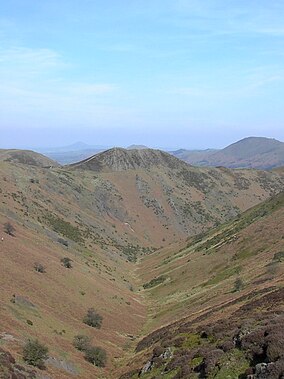 Townbrook Valley in the Long Mynd. Townbrook Valley in the Long Mynd. | |
 Location of the Shropshire Hills AONB in England Location of the Shropshire Hills AONB in England | |
| Location | Shropshire, England |
| Area | 802 km (310 sq mi) |
| Established | 1958 |
| Governing body | Shropshire Hills AONB Partnership |
| Website | www.shropshirehillsaonb.co.uk |
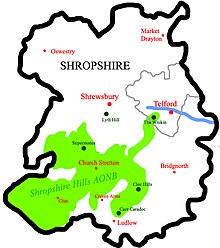
The Shropshire Hills National Landscape is a designated Area of Outstanding Natural Beauty (AONB) in Shropshire, England. It is located in the south of the county, extending to its border with Wales. Designated in 1958, the area encompasses 802 square kilometres (310 sq mi) of land primarily in south-west Shropshire, taking its name from the upland region of the Shropshire Hills. The A49 road and Welsh Marches Railway Line bisect the area north–south, passing through or near Shrewsbury, Church Stretton, Craven Arms and Ludlow.
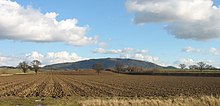
Hills
The Shropshire Hills, located in the Welsh Marches, are relatively high: the highest point in the county, Brown Clee Hill, near Ludlow, has an altitude of 540 metres (1,772 ft). This gives Shropshire the 13th highest hill per county in England. Titterstone Clee Hill, part of the Clee Hills, is nearly as high as Brown Clee, at 533 metres (1,749 ft), making it the third highest hill in the county. The Stiperstones are the second highest, at 536 metres (1,759 ft), and are notable for their tors of quartzite; particularly notable are Devil's Chair (SO368991) and Shepherd's Rock (SO373998).
More accessible hills are the Long Mynd, which covers an area of 5,436 acres (22.0 km) and peaks at Pole Bank at a height of 516 metres (1,693 feet), is near Church Stretton. It includes Carding Mill Valley, a popular recreational area which was developed as a honeypot to draw tourists away from the more sensitive/protected areas of the Mynd. One of the most famous hills is the Caer Caradoc, at 459 metres (1,506 ft) which is just by the village of All Stretton. The Wrekin (407 metres (1,335 ft)), located in the far northeastern panhandle of the AONB, is an extremely popular hill with a well-used trail. Located near Wellington, its position close to the major population centres of Shropshire, and good transport links (A5/M54) make it easy to access. Ercall Hill, a notable geological site, is located just to the north of The Wrekin.
Another prominent hill is Corndon Hill, whose summit is in Wales.
Towns and villages
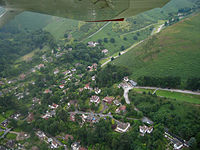
The largest town in the AONB is Church Stretton (sometimes known as "Little Switzerland"), with a population of about 3,000. The only other town within the boundaries of the AONB is Clun, with fewer than 1,000 people, in the Clun Valley.
Ludlow, the largest town in South Shropshire, lies just south of the AONB. The Shropshire Hills AONB Partnership is based at Craven Arms, just outside the development restriction boundaries. Bishop's Castle is a small town of about 1,500 people, located near the Welsh border to the west. Bucknell is a notable village in the south. Knighton has a population of just over 3,000 is across the River Teme in Wales, but its station is within the Shropshire Hills AONB.
Local authorities
The AONB falls largely within the Shropshire Council area. Its north-easternmost extremity, in the vicinity of the prominent Wrekin hill, is located in the borough of Telford & Wrekin.
Rivers
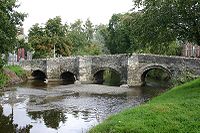
- River Clun – starting at Anchor, ends up joining the Teme
- Cound Brook – Rises from minor watercourses running off the Long Mynd and Caer Caradoc before discharging into the River Severn
- River Teme – flows through Knighton down to Bucknell then Ludlow, before passing into Herefordshire
- River Rea – flows north to south, passes through Cleobury Mortimer
Historical attractions

Attractions of historical interest located within or near the AONB include Stokesay Castle (near Craven Arms), a well-preserved fortified manor house.
Ludlow Castle in Ludlow was constructed in the 11th century as the border stronghold of one of the Marcher Lords, Roger de Lacy.
Offa's Dyke, a massive linear earthwork, also runs through the area, and across the Clun Valley area.
Clun Castle is located near Clun.
Wildlife
- Peregrine falcon
- Dipper
- Ring ouzel
- Merlin
- Curlew
- Tree sparrow
- Pied flycatcher
- Barn owl
- Red fox
- Badger
- Red grouse
- Turtle dove
- Buzzard
- Common snipe
- Northern lapwing
- Common redshank
- Red Kite
- Pine Marten
- Raven
- European goldfinch
Other attractions
- Clun Forest – remote area of woodland and hills
- Wyre Forest – large woodland, half of which is in Shropshire, the other half in Worcestershire
References
- "Archived copy". Archived from the original on 27 September 2007. Retrieved 14 May 2007.
{{cite web}}: CS1 maint: archived copy as title (link)
External links
| National Landscapes in England | ||
|---|---|---|
| East of England | 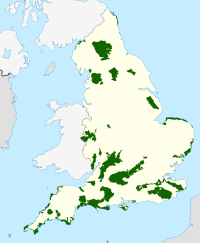 | |
| East Midlands | ||
| North East | ||
| North West | ||
| South East | ||
| South West | ||
| West Midlands | ||
| Yorkshire and the Humber | ||
| ||
| Ceremonial county of Shropshire | |
|---|---|
| Unitary authorities | |
| Major settlements (cities in italics) | |
| Rivers | |
| Canals | |
| Topics | |
52°29′42″N 2°48′58″W / 52.495°N 2.816°W / 52.495; -2.816
Categories: